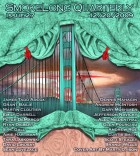What a great story, with a wonderful voice. You had me at the first line. “Becoming a bird was not what I expected.” Where did that idea come from?
First of all, thank you. This story was actually originally written as a poem (all I did for the conversion was take it out of stanza form) and like every other poem I’ve ever written (or tried to write) it started not with an idea, but with a first line. I was literally just standing on the sidewalk watching a bird hop around pecking at some trash, when a voice in my head said: “Becoming a bird was not what I expected.” I don’t know how first lines come so easily like that, because generally everything that comes after is like pulling out my own teeth.
I love it how this piece effortlessly skips from light to “serious” for lack of a better word. How did this happen?
I actually have no idea. I wrote this piece without thinking too hard about what I was writing or what it meant. I was trying to make it flow, to sound good. When I showed this to a friend of mine to read he said “It’s just like how you talk.” Though I can’t imagine that I actually talk that way. At least I hope not.
In the beginning in particular it almost sounded as if becoming a bird is similar in many respects to growing up: building a nest, learning to “feed” (i.e. spread your resources), and even pretending to know more than you do (move the beak instead of singing). Would you agree with this or did you have something else in mind?
Yeah, it definitely seems like a metaphor for life, though I’m not sure if that is what I intended. It’s funny that I often find myself using anthropomorphism, because, as a literary device, I kind of consider it cheating. The writers I admire most are those who can create a strange or surreal atmosphere or convey deep emotion (or both) without resorting to anything that couldn’t happen outside the bounds of accepted science. But I think these writers are just more talented than I am; therefore I have to rely on gimmicks like cross-dressing giraffes and disgruntled birds. Which isn’t to say that there aren’t a lot of brilliant fantasy or sci-fi writers out there who are also much more talented than I am; it’s just that that style of writing isn’t generally to my taste. Although I do like some writers who use elements of magical realism, I don’t quite get as awed as I do by writers like Chekhov who can write about banalities like drinking a cup of tea in a way that makes me lose my breath. That sort of stuff really floors me.
It sounds as if the flying is well worth the minor annoyances associated with becoming a bird. I really love the last two paragraphs of this story. So beautiful. I wonder whether there is a human equivalent to this experience—or is this a story about longing for the impossible (as impossible as becoming something you’re not)? In other words, is the story about limits or about possibilities?
Well, from a literal standpoint it’s about the fantasy of being able to fly, which is probably a fantasy just about everybody has had at one time or another. But on a metaphorical level I guess it’s about the reason why we don’t all kill ourselves. Even though life is hard at times, incredibly hard for some, most people still choose to stick it out until their natural deaths. Maybe it’s only from a sense of duty to their religion or their families or whatever else, but I still think it is an indication that most people have judged the good to be worth more than the bad, even if the good comes less frequently. I guess, yeah, it’s about those small, beautiful moments that make up for all the drudgery, hard work, and confusion. But I’m no hedonist, and I do believe that without some drudgery, you can’t really have bliss, either. I can never fully enjoy myself if I feel I’ve been being too lazy. If I want to really feel happy, I have to feel I’ve earned it.



 The core workshop of SmokeLong Fitness is all in writing, so you can take part from anywhere at anytime. We are excited about creating a supportive, consistent and structured environment for flash writers to work on their craft in a community. We are thrilled and proud to say that our workshop participants have won, placed, or been listed in every major flash competition. Community works.
The core workshop of SmokeLong Fitness is all in writing, so you can take part from anywhere at anytime. We are excited about creating a supportive, consistent and structured environment for flash writers to work on their craft in a community. We are thrilled and proud to say that our workshop participants have won, placed, or been listed in every major flash competition. Community works.